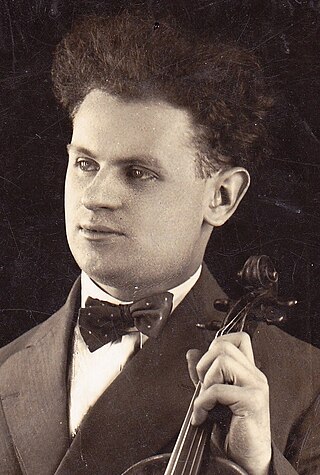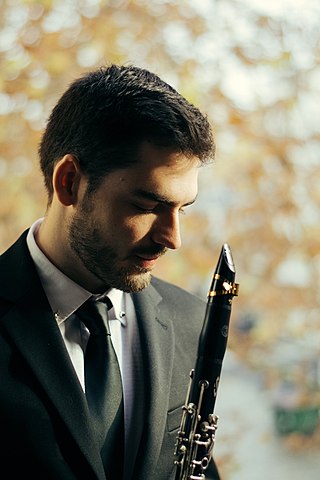Related Research Articles

Olivier Eugène Prosper Charles Messiaen was a French composer, organist, and ornithologist who was one of the major composers of the 20th century. His music is rhythmically complex. Harmonically and melodically, he employed a system he called modes of limited transposition, which he abstracted from the systems of material his early compositions and improvisations generated. He wrote music for chamber ensembles and orchestra, voice, solo organ, and piano, and experimented with the use of novel electronic instruments developed in Europe during his lifetime.

Quatuor pour la fin du temps, originally Quatuor de la fin du temps, also known by its English title Quartet for the End of Time, is an eight-movement piece of chamber music by the French composer Olivier Messiaen. It was premiered in 1941. The work is scored for clarinet, violin, cello, and piano; a typical performance of the complete work lasts about 50 minutes. Messiaen wrote the piece while a prisoner of war in German captivity and it was first performed by his fellow prisoners. It is generally considered one of his most important works.

Alexander Tansman was a Polish composer, pianist and conductor who became a naturalized French citizen in 1938. One of the earliest representatives of neoclassicism, associated with École de Paris, Tansman was a globally recognized and celebrated composer.

Henri Benjamin Rabaud was a French conductor, composer and pedagogue, who held important posts in the French musical establishment and upheld mainly conservative trends in French music in the first half of the twentieth century.

The Orchestre national de France is a French symphony orchestra based in Paris, founded in 1934. Placed under the administration of the French national radio, the ONF performs mainly in the Auditorium de Radio France, in the Maison de la Radio et de la Musique from where all its concerts are broadcast. Some concerts are also held in the Théâtre des Champs-Élysées, which was the previous main venue of the orchestra before the Auditorium was built.

Stalag VIII-A was a German World War II prisoner-of-war camp, located just to the south of the town of Görlitz in Lower Silesia, east of the River Neisse. The location of the camp lies in today's Polish town of Zgorzelec, which lies over the river from Görlitz.

Manuel Rosenthal was a French composer and conductor who held leading positions with musical organizations in France and America. He was friends with many contemporary composers, and despite a considerable list of compositions is mostly remembered for having orchestrated the popular ballet score Gaîté Parisienne from piano scores of Offenbach operettas, and for his recordings as a conductor.

David Krakauer is an American clarinetist who performs klezmer, jazz, classical music, and avant-garde improvisation.
(Guillaume) Guy Lacour was a French composer of classical music, and a tenor saxophonist.
Philippe Cuper is a French clarinetist, born in Lille on 25 April, 1957.

Raphaël Sévère born 15 September 1994 in Rennes, is a French clarinettist.

Maximilien-Paul-Marie-Félix d'Ollone was a 20th-century French composer.
Pascal Moraguès is a French clarinetist. Moragues has been the principal clarinetist of the Orchestre de Paris since 1981. He has been a professor at the Conservatoire de Paris since 1995 and a guest professor at the Superior College of Music in Osaka since 2002.
Marcel-François-Georges Delannoy was a French composer and critic. He wrote operas, ballets, orchestral works, vocal and chamber works, and film scores.
Étienne Pasquier was a French cellist.
Henri Demarquette is a French contemporary classical cellist.

Roger Jean Boutry was a French composer and conductor.

Jean-Marc Fessard is a French classical clarinetist.
Robert Lannoy was a French composer, second Prize of the Prix de Rome in 1946. He was then director of the Conservatoire de Lille for 33 years, until his death.
René Herbin was a French composer and pianist. He was killed in the Mount Cimet air disaster in the French Alps.
References
- 1 2 Rischin 2006, p. 11.
- ↑ Rischin 2006, pp. 12–13.
- ↑ Rischin 2006, p. 15.
- ↑ Rischin 2006, p. 2.
- ↑ Rischin 2006, pp. v, 96.
- ↑ Haven, Cynthia (5 November 2008). "100th birthday of Messiaen celebrated with a concert series". Stanford News.
- ↑ Rischin 2006, p. 85.
- ↑ Brown 2020, p. 179.
- ↑ Rischin 2006, p. 96.
Bibliography
- Brown, Kellie D (2020). The sound of hope: music as solace, resistance and salvation during the Holocaust and World War II. McFarland. ISBN 978-1-4766-7056-0. OCLC 1134074119.
- Rischin, Rebecca (2006). For the end of time: the story of the Messiaen quartet. Cornell University Press. ISBN 9780801472978.